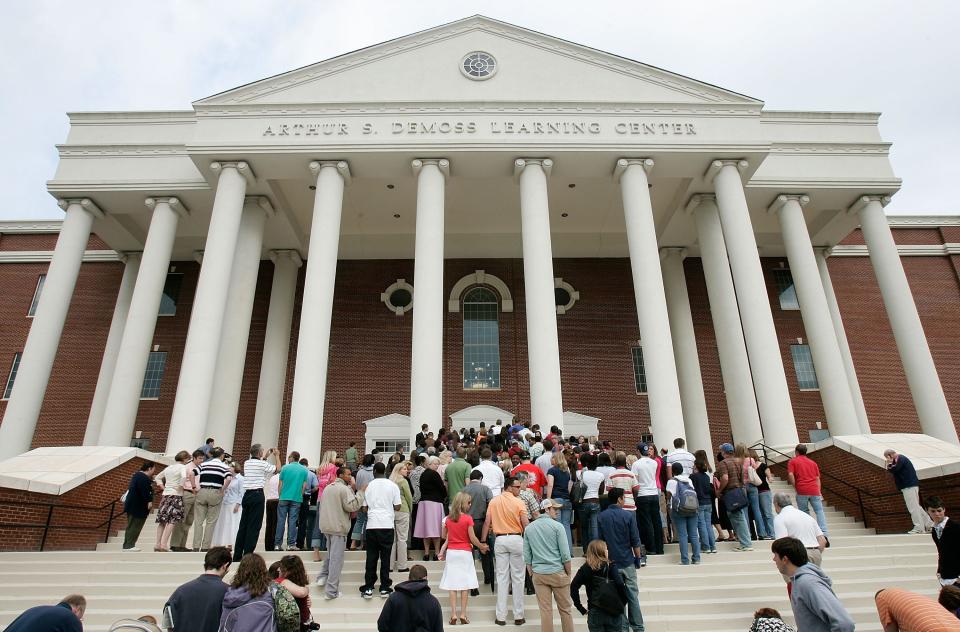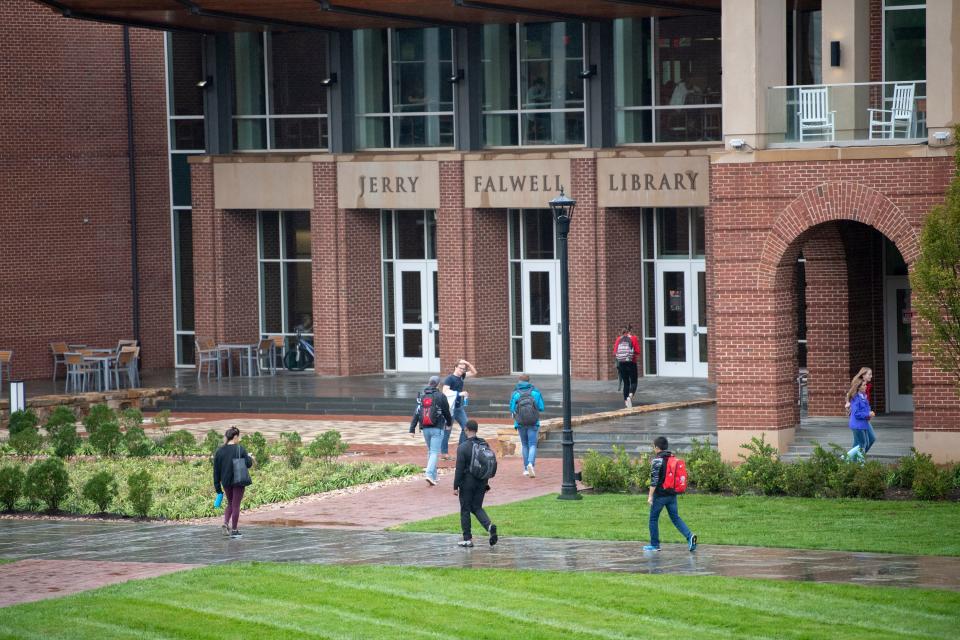Christian college admin was accused of sexual misconduct for over a decade. He kept his job.
- Oops!Something went wrong.Please try again later.
Amid a federal investigation into its role in downplaying and ignoring reports of campus sexual assaults, Liberty University has continued to employ a man accused for more than a decade of repeatedly harassing his subordinates, including student workers.
Piecing together details from a leaked version of the U.S. Department of Education’s investigative report and those from a lawsuit filed by survivors, along with accounts of former students and employees, USA TODAY has identified the man as Keith Anderson, who oversees student health at the Christian college.
Liberty faces a potential multimillion-dollar fine from the Education Department for its treatment of students, including allegations that it failed to warn them of potential dangers. Investigators said there was no indication it alerted the Virginia campus after Anderson, identified in its report as Employee A, “engaged in a pattern of disturbing behaviors” from 2012 to 2014, when he was dean of students.
His “inappropriate sexual behavior,” the May report said, likely posed a “serious threat.”

Two of the dozen women who sued Liberty in 2021 over the school’s response to sexual assault named Anderson as the man who attacked or harassed them. Several events described in that suit are mirrored in the government report, including one when Anderson showed up at an employee’s home unannounced and forced her to take “medicine” that left her drowsy. The civil suit alleges that the woman woke to Anderson’s hands around her neck.
More: Feds say Liberty University created 'fear of reprisal' for sexual violence survivors
USA TODAY spoke with a student who had worked in the Dean of Students office and recalled an incident in 2013 with Anderson that left her feeling ashamed. The woman said she was wearing a pencil skirt with a hem at the knee when she entered Anderson’s office and sat on the couch.
“He told me I was inappropriate, and I then needed to cover myself because my knees were showing,” the woman told USA TODAY. “I cannot even tell you what the rest of that meeting was about because I was so humiliated.”
The woman, who spoke on condition of anonymity because of the sensitive topic, said at the time that she felt like a “sinner” for possibly causing a Christian man to stumble in his faith. She left the university shortly after, but it took her more than half a decade before she could look back on the event with clear eyes.
“I feel that he made those big, holy gestures to cover up what he was doing behind closed doors (which is a pun here – because men and women couldn’t be in a room together with a closed door),” she wrote in a message to a reporter.
Liberty University did not answer USA TODAY’s specific questions but said broadly of questions related to Anderson that “governmental reviewers and Jane Does 1 and 8 have all received truthful and appropriate explanations.” Anderson did not respond to USA TODAY’s requests for comment.
Liberty is one of the nation’s most prominent Christian universities and a popular speaking destination among top Republican politicians. Jerry Falwell, a prominent televangelist and conservative booster who supported Ronald Reagan, started the school in 1971. Based in Virginia, the university owes its recent growth to online students – a combined student body of about 93,000 – and it received about $857 million in federal money for student aid, which makes it one of the largest recipients of such funding.
Accepting that student assistance is what automatically triggered oversight by the Education Department. Part of its inquiry focused on the Liberty Way, the university student code of conduct that survivors say created an environment that allowed sexual violence to go unmonitored and unchecked. And in 2021, ProPublica documented how women who had been raped faced potential violations of the school’s code of conduct after they reported what happened to them.

The department’s investigation of Liberty continues, and a large fine is expected. After receiving the May report, the college said it responded by “detailing significant errors, misstatements, and unsupported conclusions in the Department’s preliminary findings.”
University President Dondi Costin recently told Fox News that Liberty was facing a $37.5 million penalty. He added he believed the government was unfairly targeting the school and accused it of leaking the May report.
The institution’s image as a Christian sanctuary has been challenged in recent years, often by the actions of its own leadership. Jerry Falwell Jr. – who took over as president after his father’s death in 2007 and helped shape it into the massive institution it is today – resigned in 2020 after a sex scandal involving him, his wife and another man. Falwell Jr. was also among the first Evangelical conservatives to endorse Donald Trump in the leadup to the 2016 election.
Who is Keith Anderson and what did he do at Liberty?
On Liberty’s website, Anderson is identified as executive director of student health and wellness, an office that oversees health records, wellness initiatives and on-campus medical treatment.
He has been at Liberty since at least 2007, when he was named dean of students, overseeing student counseling, spiritual guidance and discipline. As of 2014, he had been replaced in that job by Robert Mullen, according to a news release. No reason was given; the announcement said only that Anderson “now serves as the director of student health records.” Anderson is also a pastor in the Lynchburg area.
The civil case against Liberty initially involved a dozen women identified as “Jane Does” to protect their identities. The women accused Liberty of creating an environment where rape and sexual harassment were more likely to happen because of the university’s rules and through “public and repeated retaliation against women who did report their victimization.”
Ten more were prepared to join the suit, and all but two settled with the university in a confidential agreement.
Jane Doe 8 said Anderson made “sexually explicit comments directed toward her and to student workers and other supervisors.” These incidents occurred from 2008 to 2011, she said, while she worked in the student conduct office.
The university was aware of Anderson’s behavior and responded by revealing Jane Doe 8’s identity to Anderson, the lawsuit says. That led Anderson to increase “his campaign of inappropriate and sexual comments,” the lawsuit says, and caused her to eventually leave her job.
She said she reported the incident to several university leaders, including Falwell Jr. and Jonathan Falwell – his brother and lead pastor of Thomas Road Baptist Church – but didn’t receive a response from any of them.

Falwell Jr. recently told USA TODAY that top administrators “saw it as their job to keep me from being aware of any reported crimes or accusations of assault.”
A similar incident is referenced in the Education Department report in which a former employee in 2012 reported to university leadership and “the pastor of Thomas Road Baptist Church that for at least three years, she continuously felt uncomfortable and afraid of Employee A due to his disturbing behavior and sexually charged comments.”
USA TODAY obtained an email written by a former employee in the Dean of Students office that contained similar allegations. The message was addressed in 2012 to Falwell Jr. and Neil Askew, a board trustee.
The sender wrote that he had worked for demanding and vulgar supervisors while in the military, but he could “not in good conscience continue to work for Keith.” The writer blamed more than a dozen departures in the dean of students’ office on Anderson’s leadership.
“In the past year, two of the female employees in the office told me that Keith had made comments of a sexually inappropriate nature to them,” the email read.
The former Liberty employee went on to write that Anderson made derogatory comments toward other administrators, insinuating one was racist and that another was gay – and thus should be avoided.
Unwanted house visits, an unmarked pill and questions over Anderson’s job
The connections between the civil suit and the Education Department report are clearest in the case of Jane Doe 1. She was a Liberty employee who suffered an allergic reaction, “on or about Oct. 15, 2013.”
Anderson, who was her supervisor, arrived at her home with medication described as “a single, unmarked and unwrapped tablet,” the suit said. She initially refused to take it but relented, she said, to try to get Anderson to leave. She became woozy and fell asleep. She woke up to Anderson’s hands around her neck, the suit says. She then threatened to scream and he finally left.
The lawsuit says Anderson returned to the woman’s home the next day and denied touching her the night before. He asked if he could “rub medicated cream on Doe 1’s body.” She again refused initially but eventually “allowed him to apply medicated cream to her back” to try to get him to leave.
“While doing so Anderson forcefully kissed her, on the lips, against her will,” the civil suit reads.
The woman said that after the medicine episode, Anderson became threatening and stalked her. She ultimately was fired from the university, according to the lawsuit.
That account is extremely similar to one in the Education Department report about Employee A.
It notes that the man showed up at an employee’s home on Oct. 13, 2013, and “gave the woman what he referred to as ‘medicine’ which caused her to fall asleep.” When the woman awoke, she said, Employee A was kissing her. A human resources investigation of the incident noted Employee A acknowledged being at a subordinate’s home and “rubbing lotion on her back.”

The government report states that the man was demoted but then promoted within a year. It warns: “The information developed and examined by the Department, thus far, indicates that a reasonable person would have concluded that Employee A's continued presence on campus created a dangerous condition that could have posed an immediate threat to some campus community members.”
Students and employees, current and former, told investigators they were “extremely concerned” that the man remained on campus. Investigators even asked the current provost why he still had a job, and the provost responded, according to the report: “I do not know.”
Elizabeth Bailey, an attorney for the Jane Does 1 and 8, declined to comment. In 2021, the podcast Gangster Capitalism documented similar allegations against Anderson from past employees and featured comments from women who said they were harassed or assaulted by Anderson, including Jane Doe 1.
The original attorney for the civil case, Jack Larkin, did not respond to USA TODAY’s request for comment. Many of the women involved, represented by Bailey, are now suing Larkin in the Chester County Court of Common Pleas in Pennsylvania.
They say Larkin provided inadequate legal guidance and pressured them to settle. They also say he failed to explain their settlement agreements “fundamentally reduced the Plaintiffs’ ability to discuss their claims, waived substantial privacy rights, and exposed them to a retaliatory response from the University if they did talk.”
What’s next for the Education Department and Liberty University?
The federal government will issue its final report, and with it a likely record fine. That could open the school to further civil suits. Former Liberty University students also are pushing the government and other oversight agencies to investigate further.
Some survivors fear a financial penalty alone will not motivate Liberty to change. They are pressing the government to open a separate investigation into how the school complies with Title IX, a gender anti-discrimination law.
That includes Chelsea Andrews, one of the Jane Does in the lawsuit that was settled. She said she has spoken to the Education Department about its investigation and has helped connect women who suffered sexual assault to investigators and journalists.
She worked in the student conduct office but declined to provide details about what information she had shared with the government. She reported up to Anderson in the time frame highlighted by investigators but was not attacked by him.
Waiting for the government to act is frustrating for Andrews. It’s challenging, she said, to continue to revisit her attack for government investigators or reporters. And barring any federal government action, she fears the school won’t change its ways.
She also has heard from current students, she said, who feel they can’t turn to anyone at Liberty for help.
“Just because a report happened,” Andrews said, "that does not mean that the current student body who is there right now in this moment is more safe.”
Chris Quintana is an investigative reporter at USA TODAY. He can be reached at cquintana@usatoday.com or via Signal at 202-308-9021.He is on X at @CQuintanaDC.
This article originally appeared on USA TODAY: Christian college admin kept campus job after sexual misconduct claims

